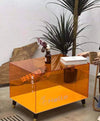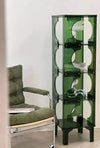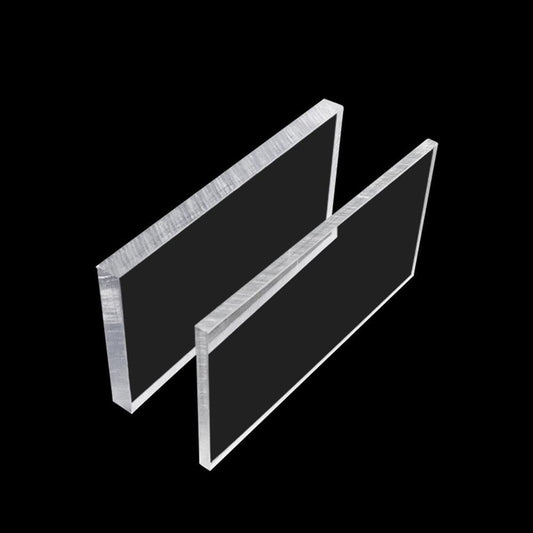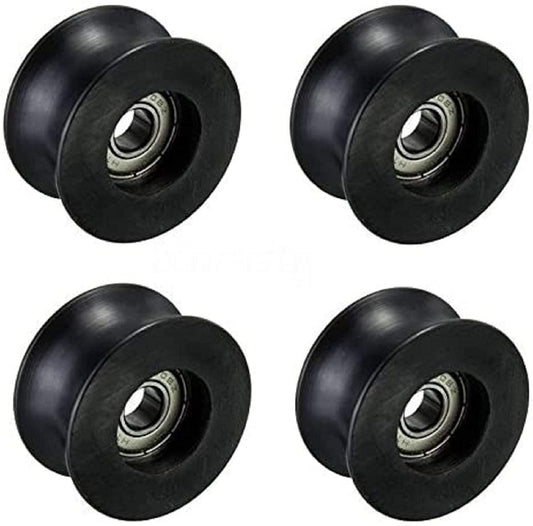Unlock the full potential of ABS plastic sheets with our comprehensive guide tailored for beginners. This post covers everything you need to know, from the basic composition and benefits of ABS sheets to their various sizes and thicknesses. Learn about the wide range of colors and surface finishes, making ABS a versatile choice for any project. Dive into the key applications of ABS sheets across different industries such as automotive, construction, and consumer products. Discover the best practices for processing and forming ABS plastic sheets, including cutting and thermoforming techniques. We also explore the environmental benefits and recyclability of ABS sheets, ensuring your projects are sustainable. Finally, get expert tips on selecting the best suppliers for high-quality ABS sheets. Whether you're a hobbyist or a professional, this guide will provide you with all the essential knowledge to make the most of ABS plastic sheets.

What is ABS Plastic Sheet?
Introduction to ABS Plastic Sheets
ABS plastic sheets, known as Acrylonitrile Butadiene Styrene sheets, are a highly versatile and widely used thermoplastic material. They are created through the polymerization of acrylonitrile and styrene in the presence of polybutadiene, resulting in a material that combines the strength and rigidity of acrylonitrile and styrene with the toughness of polybutadiene.
Composition and Manufacturing Process
The composition of ABS plastic sheets is a unique blend that offers a balance of desirable properties. Acrylonitrile provides chemical resistance and surface hardness, butadiene adds impact strength and toughness, while styrene contributes to rigidity and ease of processing. This combination is achieved through a complex manufacturing process where these monomers are polymerized to form a tough and durable plastic.
In the manufacturing process, raw materials are first mixed and then polymerized through a process called emulsion polymerization. This involves the emulsification of acrylonitrile and styrene in the presence of polybutadiene, resulting in a fine dispersion of rubber particles within the thermoplastic matrix. The end product is a plastic that exhibits a unique set of properties suitable for various applications.
Key Properties of ABS Plastic Sheets
ABS plastic sheets are renowned for their impact resistance and chemical resistance, making them ideal for applications requiring durability and toughness. The material's excellent thermal stability allows it to withstand varying temperatures without deforming, which is crucial for both indoor and outdoor applications.
Moreover, ABS sheets are lightweight yet rigid, providing structural strength without adding significant weight. This characteristic is particularly beneficial in the automotive and construction industries, where reducing weight can lead to improved efficiency and performance.
Why ABS Plastic Sheets are Preferred in Many Industries
The versatility and beneficial properties of ABS plastic sheets make them a preferred choice across multiple industries. In the automotive industry, ABS sheets are used for interior and exterior trim, dashboards, and other components due to their high impact resistance and aesthetic finish.
In the construction industry, these sheets are employed in the manufacturing of doors, windows, and roofing materials, thanks to their durability and resistance to harsh environmental conditions.
The signage and display industry also benefits from ABS sheets' ability to be easily thermoformed and printed upon, making them perfect for creating eye-catching and long-lasting signs and displays.
Conclusion
ABS plastic sheets are an indispensable material across various industries due to their unique blend of toughness, rigidity, and resistance to chemicals and temperature. Understanding their composition, manufacturing process, and key properties highlights why ABS sheets are a top choice for many commercial and industrial applications. Whether you are in automotive, construction, or signage, ABS plastic sheets offer the performance and versatility needed to meet demanding project requirements.

Common Sizes and Thicknesses of ABS Plastic Sheets
Standard Sizes of ABS Plastic Sheets
ABS plastic sheets come in various sizes to meet the diverse needs of different industries. One of the most popular sizes is the ABS plastic sheet 4x8. This size, measuring 4 feet by 8 feet, is widely used in various applications due to its versatility and ease of handling. The 4x8 abs sheet is ideal for large-scale projects where extensive coverage is required without the need for multiple smaller sheets.
Other common sizes include smaller dimensions that can be easily managed and transported. These sizes are particularly useful for DIY projects and smaller commercial applications where precise measurements are essential.
Thickness Variations in ABS Plastic Sheets
The thickness of ABS plastic sheets varies significantly, providing options for different structural and functional requirements. Two commonly used thicknesses are the 1/4 ABS plastic sheet and the 1/8 ABS plastic sheet.
1/4 Inch ABS Plastic Sheet
The 1/4 ABS plastic sheet offers substantial rigidity and strength, making it suitable for applications that require enhanced durability and impact resistance. This thickness is commonly used in automotive components, protective casings, and structural parts. Its robust nature ensures that it can withstand high-stress environments and provide long-lasting performance.
1/8 Inch ABS Plastic Sheet
On the other hand, the 1/8 ABS plastic sheet is thinner and more flexible, making it ideal for applications where lighter weight and easier manipulation are necessary. This thickness is often chosen for decorative elements, interior trims, and applications where detailed shaping and forming are required. Despite its thinner profile, it still maintains excellent impact resistance and surface hardness.
Application Scenarios for Different Sizes and Thicknesses
Large-Scale Applications
For large-scale applications, such as construction projects, signage, and large machinery covers, the 4x8 ABS sheet provides the necessary coverage without the need for extensive joining or cutting. This reduces installation time and ensures a seamless appearance.
Automotive and Industrial Uses
In the automotive industry, thicker ABS sheets like the 1/4 ABS plastic sheet are preferred for their strength and impact resistance. These sheets are used in manufacturing parts like bumpers, dashboards, and door panels, where durability is crucial.
DIY and Small-Scale Projects
For DIY enthusiasts and small-scale projects, the 1/8 ABS plastic sheet offers the flexibility needed for intricate designs and ease of handling. This thickness is perfect for model making, custom parts, and hobby projects where precise cutting and shaping are required.
Choosing the Right Size and Thickness
When selecting the right ABS plastic sheet for your project, consider the specific requirements of your application. For structural integrity and heavy-duty use, opt for thicker sheets like the 1/4 inch ABS plastic sheet. For more flexible and detailed work, thinner sheets such as the 1/8 inch ABS plastic sheet are ideal.
Understanding the sizes and thicknesses available in ABS plastic sheets helps ensure you choose the best material for your needs, balancing strength, flexibility, and ease of use to achieve optimal results.
Colors and Surface Finishes of ABS Plastic Sheets
Variety of Colors in ABS Plastic Sheets
ABS plastic sheets are available in a wide range of colors, offering both functional and aesthetic benefits for various applications. Two of the most popular colors are black ABS plastic sheets and white ABS plastic sheets. Each color has unique properties and uses, making them suitable for different projects.
Black ABS Plastic Sheet
Black ABS plastic sheets are widely used due to their ability to hide dirt, scratches, and imperfections, making them ideal for applications where aesthetics and durability are important. The black color also provides excellent UV resistance, which is beneficial for outdoor applications. Additionally, black ABS sheets are commonly used in automotive interiors and exteriors, electronic housings, and industrial equipment.
White ABS Plastic Sheet
White ABS plastic sheets offer a clean and professional appearance, making them suitable for applications in medical devices, laboratory equipment, and consumer electronics. The white color enhances visibility, which is particularly useful in settings where cleanliness and precision are critical. White ABS sheets can also be easily painted or printed on, allowing for customization in branding and design.
Surface Finishes of ABS Plastic Sheets
ABS plastic sheets are available in various surface finishes, each offering distinct advantages depending on the application. The most common finishes include smooth and matte surfaces.
Smooth Surface ABS Sheets
Smooth surface ABS sheets provide a sleek and glossy finish, which is ideal for applications requiring a high-quality appearance. The smooth surface is easy to clean and maintain, making it suitable for use in kitchen appliances, display panels, and signage. Additionally, smooth ABS sheets can be easily laminated with decorative films or coatings to enhance their aesthetic appeal.

Matte Surface ABS Sheets
Matte surface ABS sheets offer a non-reflective finish, reducing glare and fingerprints. This finish is perfect for applications where light reflection needs to be minimized, such as in automotive dashboards, control panels, and interior trim. The matte surface also provides a subtle and sophisticated look, making it a popular choice for modern design applications.
Advantages of Different Colors and Finishes
Functional Benefits
The choice of color and surface finish in ABS plastic sheets can significantly impact their functionality. For instance, black ABS sheets are preferred for their UV resistance and ability to conceal wear and tear, making them ideal for outdoor and high-traffic applications. On the other hand, white ABS sheets are favored in environments where hygiene and visibility are paramount, such as in medical and laboratory settings.
Aesthetic Benefits
From an aesthetic perspective, the smooth and glossy finish of ABS sheets provides a polished and professional look, suitable for consumer products and display applications. Conversely, the matte finish offers a contemporary and understated appearance, ideal for automotive interiors and sophisticated design projects.
Conclusion
Understanding the variety of colors and surface finishes available in ABS plastic sheets helps in selecting the right material for specific applications. Whether you need the durability and UV resistance of black ABS sheets, the cleanliness and visibility of white ABS sheets, or the specific aesthetic provided by smooth or matte finishes, ABS plastic sheets offer versatile solutions for a wide range of industrial, commercial, and consumer applications.
Major Applications of ABS Plastic Sheets
Automotive Industry
ABS sheeting is extensively used in the automotive industry due to its excellent impact resistance, durability, and ease of fabrication. Automotive manufacturers utilize ABS plastic sheeting for various interior and exterior components. For instance, dashboards, door panels, and instrument panels are commonly made from ABS sheets due to their ability to withstand wear and tear while providing a sleek, aesthetic finish.
Examples in Automotive Applications
Dashboards and Instrument Panels: The impact resistance and moldability of ABS sheets make them ideal for creating complex shapes and designs needed in modern car interiors. These parts must endure frequent use and exposure to varying temperatures, making ABS an excellent choice.
Exterior Trim and Body Panels: ABS plastic sheeting is also used for exterior trims and body panels. The material's resistance to environmental factors such as UV radiation and temperature fluctuations ensures long-lasting performance and appearance.
Construction Industry
In the construction industry, ABS sheeting is valued for its strength, ease of installation, and versatility. Builders and architects often use ABS sheets for a variety of purposes, including wall panels, roofing materials, and protective barriers.
Examples in Construction Applications
Wall Panels and Partitions: ABS plastic sheeting provides a durable and aesthetically pleasing option for interior wall panels and partitions. Its ability to be easily cut and shaped allows for custom designs and installations.
Roofing Materials: The weather resistance of ABS sheets makes them suitable for roofing applications. They can withstand harsh weather conditions, providing a reliable and long-lasting roofing solution.
Signage and Display Industry
The signage and display industry benefits significantly from the use of ABS plastic sheeting. Its ability to be easily printed on, combined with its durability and range of available colors, makes it a popular choice for both indoor and outdoor signs.
Examples in Signage and Display Applications
Retail Displays: Retailers use ABS sheeting to create attractive and durable displays for their products. The material's smooth surface allows for high-quality printing, making it ideal for branding and promotional displays.
Outdoor Signage: The UV resistance and weatherproof nature of ABS sheets ensure that outdoor signs remain vibrant and intact over time, even when exposed to the elements.

Consumer Products
ABS plastic sheeting is also prevalent in the manufacturing of various consumer products. Its versatility and durability make it suitable for items ranging from household appliances to toys and electronics.
Examples in Consumer Product Applications
Household Appliances: ABS sheets are used in the production of refrigerator liners, vacuum cleaner housings, and kitchen appliance panels. The material's resistance to impact and chemicals ensures that these products can withstand daily use.
Toys and Games: The toy industry utilizes ABS sheeting for its durability and safety. Many toys, including action figures and building blocks, are made from ABS plastic, providing a sturdy and safe option for children.
Conclusion
ABS plastic sheets are indispensable across various industries due to their unique properties and versatility. From automotive and construction to signage and consumer products, ABS sheeting offers solutions that meet the diverse needs of these sectors. Whether for functional or aesthetic purposes, ABS plastic sheeting continues to be a preferred material for manufacturers and designers alike, proving its value through wide-ranging applications and reliable performance.
Processing and Forming Techniques of ABS Plastic Sheets
Vacuum Forming
Vacuum forming is a widely used technique for shaping ABS plastic sheets. This process involves heating a sheet of ABS plastic until it becomes pliable, then draping it over a mold. A vacuum is then applied, sucking the plastic tightly against the mold, creating a detailed shape.
Steps for Vacuum Forming
- Heating the ABS Sheet: The 1/4 ABS sheet or 1/8 ABS sheet is heated to its forming temperature, typically between 300°F and 400°F, depending on the thickness and specific type of ABS.
- Molding: Once pliable, the heated sheet is placed over the mold.
- Applying the Vacuum: A vacuum is applied, pulling the sheet tightly against the mold and ensuring it takes on all the mold’s details.
- Cooling and Finishing: The formed sheet is allowed to cool before being trimmed and finished to remove excess material and refine the edges.
Thermal Forming
Thermal forming or thermoforming is another common method for shaping ABS plastic. This process involves heating the plastic sheet until it becomes soft, then forming it over a mold using pressure.
Steps for Thermal Forming
- Preheating the Sheet: The ABS plastic sheet is evenly heated to the desired forming temperature.
- Forming: The heated sheet is quickly transferred to a mold, and pressure is applied to shape it. This can be done using a press or a combination of vacuum and pressure.
- Cooling: The formed sheet is cooled while maintaining its shape, ensuring it retains the molded form.
- Trimming: Excess material is trimmed away, and the edges are smoothed.
Cutting ABS Plastic Sheets
Cutting ABS plastic sheets requires precision to ensure clean edges and accurate dimensions. The cutting method often depends on the thickness of the sheet.
Cutting Methods
- Utility Knife: For thinner sheets, such as the 1/8 ABS plastic sheet, a sharp utility knife can be used. Scoring the sheet multiple times along a straight edge and then snapping it along the scored line can achieve a clean cut.
- Jigsaw: For thicker sheets like the 1/4 ABS sheet, a jigsaw with a fine-toothed blade is preferred. This method allows for more intricate cuts and shapes.
- CNC Machine: For high precision and complex shapes, a CNC machine can be used to cut ABS plastic sheets accurately.
Bonding and Joining ABS Plastic Sheets
Bonding and joining ABS plastic sheets require the right adhesives and techniques to ensure strong and durable joints.
Adhesive Bonding
- Surface Preparation: Clean the surfaces to be bonded, removing any dust, grease, or contaminants.
- Applying Adhesive: Use a suitable adhesive, such as methyl methacrylate (MMA) or epoxy, which is compatible with ABS plastic.
- Clamping: Align the sheets and clamp them together to ensure proper contact and bonding. Allow sufficient curing time as specified by the adhesive manufacturer.
Mechanical Joining
- Drilling and Screwing: For a more secure mechanical bond, drilling holes and using screws or bolts can join ABS sheets. Ensure the drilled holes are slightly larger than the screws to allow for material expansion and contraction.
- Riveting: Rivets can be used to join ABS sheets, providing a strong mechanical bond. This method is commonly used in applications where adhesives are not suitable.
Conclusion
Understanding the various processing and forming techniques for ABS plastic sheets is essential for achieving desired shapes and properties in your projects. Whether using vacuum forming for detailed shapes, thermal forming for robust components, or cutting and bonding for precise assembly, these methods offer versatile solutions for working with ABS plastic sheets.

Environmental Performance and Recyclability of ABS Plastic Sheets
Environmental Performance of ABS Plastic Sheets
ABS plastic sheets, known for their versatility and durability, also offer significant environmental benefits. One of the primary advantages is their long lifespan, which reduces the need for frequent replacements and lowers overall material consumption. This characteristic is particularly important in applications where durability is crucial, such as in automotive parts and building materials.
Energy Efficiency in Production
The production of ABS plastic involves relatively low energy consumption compared to other plastics. The efficiency in manufacturing processes helps reduce the overall carbon footprint of ABS products. Furthermore, innovations in production techniques continue to improve the energy efficiency of ABS plastic sheet manufacturing, making it a more sustainable option.
Recyclability of ABS Plastic Sheets
Recyclability is a key factor in the environmental sustainability of ABS plastic sheets. ABS plastic can be recycled multiple times without significant degradation of its properties, making it an excellent candidate for a circular economy.
Recycling Process for ABS Plastic Sheets
-
Collection and Sorting: The first step in recycling ABS plastic involves collecting and sorting used ABS products. This can include a variety of items such as old automotive parts, electronic housings, and discarded construction materials.
-
Shredding and Cleaning: The sorted ABS plastic is then shredded into smaller pieces. These pieces are cleaned to remove any contaminants or residues, ensuring the purity of the recycled material.
-
Melting and Reforming: The cleaned ABS fragments are melted down and reformed into new ABS plastic sheets. This process can be repeated multiple times, allowing the same material to be reused in different applications.
Importance in Sustainable Development
The ability to recycle ABS plastic sheets plays a critical role in promoting sustainable development. By reducing the need for virgin plastic production, recycling helps conserve natural resources and decreases greenhouse gas emissions associated with manufacturing processes.
Practical Applications of Recycled ABS Sheets
Recycled ABS plastic sheets find applications in numerous industries. For example, in the automotive sector, recycled ABS is used to manufacture non-critical components such as interior trim and underbody shields. In the construction industry, recycled ABS sheets are employed in making durable and cost-effective building materials.
Advantages of Using Recycled ABS Plastic
Economic Benefits
Utilizing recycled ABS plastic can lead to significant cost savings. The production of recycled ABS sheets typically requires less energy and raw materials, which translates to lower manufacturing costs. These savings can be passed on to consumers, making products more affordable.
Environmental Benefits
Using recycled ABS plastic sheets reduces the demand for new raw materials and minimizes waste. This practice helps decrease landfill usage and reduces the environmental impact of plastic waste. Additionally, recycling ABS contributes to a reduction in pollution and greenhouse gas emissions, supporting global efforts to combat climate change.
Conclusion
The environmental performance and recyclability of ABS plastic sheets make them a sustainable choice for various applications. By understanding the recycling process and the benefits it offers, industries can make informed decisions that contribute to sustainable development and environmental conservation. Whether used in automotive, construction, or consumer products, ABS plastic sheets provide a versatile and eco-friendly solution.
How to Choose a High-Quality ABS Plastic Sheet Supplier
Importance of Quality Assurance
When selecting a supplier for ABS plastic sheets, ensuring quality assurance is paramount. A reputable supplier should provide certified quality standards for their products, ensuring that the sheets meet specific mechanical and chemical properties. This guarantees that the ABS sheets will perform reliably in their intended applications.
What to Look For
- Certification: Look for suppliers that offer products with certifications such as ISO 9001, which indicates that their manufacturing processes meet international quality standards.
- Material Testing: Ensure the supplier conducts regular material testing to verify the properties of their ABS plastic sheets, such as impact resistance, tensile strength, and thermal stability.
Price Considerations
While price is a critical factor, it should not be the sole determinant when choosing a supplier. The cheapest option might not always provide the best value in terms of quality and durability.
Balancing Cost and Quality
- Competitive Pricing: Compare prices from multiple suppliers to ensure you are getting a competitive rate for 4x8 sheet of ABS plastic.
- Value for Money: Consider the overall value, including quality, reliability, and longevity of the ABS plastic sheets offered. Higher quality materials may have a higher upfront cost but offer better performance and longer life, reducing long-term expenses.
Delivery Time and Reliability
Timely delivery is crucial, especially for industries that rely on just-in-time inventory systems.
Evaluating Delivery Capabilities
- Lead Times: Assess the lead times offered by the supplier for various quantities of ABS plastic sheets. Reliable suppliers should be able to provide quick turnaround times for standard and custom orders.
- Logistics: Consider the supplier’s logistics and distribution network. Suppliers with robust logistics can ensure consistent and timely delivery, minimizing project delays.
Customer Service and After-Sales Support
Excellent customer service and after-sales support are essential components of a good supplier relationship. These services ensure that any issues or concerns are promptly addressed.
Key Aspects of Customer Service
- Communication: Choose suppliers who are responsive and communicative. They should provide clear information and updates regarding your orders.
- Technical Support: Suppliers should offer technical support to assist with any questions regarding the use or processing of their ABS plastic sheets.
- Returns and Warranties: Look for suppliers that provide warranties on their products and have a straightforward returns policy in case the ABS sheets do not meet your expectations.
Additional Considerations
Environmental Policies
Suppliers that adhere to environmental sustainability practices should be preferred. This includes the use of recycled materials and environmentally friendly manufacturing processes.
Customization Options
If your projects require specific sizes, colors, or finishes, ensure the supplier offers customization options. This flexibility can be critical for meeting unique project requirements.
Conclusion
Selecting a reliable supplier for ABS plastic sheets involves considering multiple factors such as quality assurance, pricing, delivery reliability, customer service, and environmental practices. By evaluating these aspects carefully, you can ensure that you choose a supplier who meets your needs and supports the success of your projects. Whether you are sourcing for automotive, construction, signage, or consumer products, these guidelines will help you make an informed decision.

Frequently Asked Questions About ABS Plastic Sheets and BeePlastics Customization
1. What customization options does BeePlastics offer for ABS plastic sheets?
Answer: BeePlastics can undertake any customization, including sample customization and batch customization. Whether you need specific sizes, shapes, colors, or surface finishes, BeePlastics has the capabilities to meet your unique requirements. They can also handle complex designs and intricate details to ensure your project specifications are fully met.
2. What file formats does BeePlastics accept for customization requests?
Answer: BeePlastics accepts a variety of file formats to make the customization process seamless. You can submit your designs in formats such as PDF, CAD, DWG, DXF, and more. This flexibility ensures that your design can be accurately translated into the final product without any compatibility issues.
3. Is there a minimum order quantity (MOQ) for custom ABS plastic sheets?
Answer: No, there is no minimum order quantity (MOQ) at BeePlastics. Whether you need a single custom piece or a large batch, BeePlastics is equipped to handle orders of any size, providing flexibility for both small-scale projects and large-scale production runs.
4. How does BeePlastics manage the production cycle for custom orders?
Answer: The production cycle at BeePlastics is tailored according to the amount of orders and the complexity of the process. They communicate with customers in real time about the production progress, ensuring transparency and allowing you to plan accordingly. This approach helps manage timelines and meet project deadlines efficiently.
5. Does BeePlastics provide samples for custom ABS plastic sheets?
Answer: Yes, BeePlastics supports the provision of samples. Customers are only responsible for the shipping costs, and the sample itself is provided free of charge. This allows you to evaluate the quality and suitability of the material before committing to a larger order.
6. What are the common sizes available for ABS plastic sheets?
Answer: ABS plastic sheets come in various standard sizes, with the most popular being the 4x8 sheet of ABS plastic. Other common sizes include smaller dimensions that cater to specific project requirements. Custom sizes can also be ordered to fit unique specifications.
7. What thickness options are available for ABS plastic sheets?
Answer: ABS plastic sheets are available in multiple thickness options, including 1/4 inch and 1/8 inch. These thicknesses cater to different applications, providing flexibility for various structural and aesthetic requirements. Custom thicknesses can also be requested to suit specific needs.
8. How durable are ABS plastic sheets in outdoor applications?
Answer: ABS plastic sheets are highly durable in outdoor applications due to their excellent resistance to UV radiation and environmental factors. Black ABS plastic sheets are particularly favored for outdoor use as they provide enhanced UV resistance, making them ideal for signage, exterior trims, and other outdoor components.
9. What are the environmental benefits of using ABS plastic sheets?
Answer: ABS plastic sheets offer several environmental benefits, including recyclability and a long lifespan. They can be recycled multiple times without significant degradation of properties, reducing the need for new raw materials and minimizing waste. This makes ABS plastic a sustainable choice for various applications.
10. How can I ensure the quality of ABS plastic sheets from BeePlastics?
Answer: BeePlastics ensures the quality of their ABS plastic sheets through strict quality control measures and certifications such as ISO 9001. They conduct regular material testing to verify properties like impact resistance, tensile strength, and thermal stability. Additionally, customer reviews and testimonials can provide insights into the consistent quality and reliability of their products.
These FAQs cover a broad range of topics related to ABS plastic sheets and the customization services offered by BeePlastics, helping you make informed decisions for your projects. If you have any other questions or need further assistance, BeePlastics’ customer service team is always ready to help.
Conclusion
Choosing the right ABS plastic sheets and understanding their various applications can significantly impact the success of your projects. Whether you are involved in the automotive, construction, signage, or consumer products industry, ABS plastic sheets offer unmatched versatility, durability, and aesthetic appeal. By leveraging the customization options provided by BeePlastics, including a wide range of sizes, thicknesses, colors, and finishes, you can ensure your specific needs are met with precision and quality. Furthermore, the recyclability and environmental benefits of ABS plastic sheets make them a sustainable choice for modern applications. For high-quality ABS plastic sheets and exceptional customer service, BeePlastics stands out as a reliable partner in achieving your project goals.

Contact Us for Premium ABS Plastic Solutions
- Have questions or need a quote? Complete the contact form below to connect with our team of experts who are ready to assist you.
- For detailed information on our machining capabilities, click here to explore our services.






